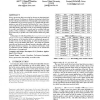Free Online Productivity Tools
i2Speak
i2Symbol
i2OCR
iTex2Img
iWeb2Print
iWeb2Shot
i2Type
iPdf2Split
iPdf2Merge
i2Bopomofo
i2Arabic
i2Style
i2Image
i2PDF
iLatex2Rtf
Sci2ools
107
click to vote
KDD
2006
ACM
2006
ACM
On privacy preservation against adversarial data mining
Privacy preserving data processing has become an important topic recently because of advances in hardware technology which have lead to widespread proliferation of demographic and sensitive data. A rudimentary way to preserve privacy is to simply hide the information in some of the sensitive fields picked by a user. However, such a method is far from satisfactory in its ability to prevent adversarial data mining. Real data records are not randomly distributed. As a result, some fields in the records may be correlated with one another. If the correlation is sufficiently high, it may be possible for an adversary to predict some of the sensitive fields using other fields. In this paper, we study the problem of privacy preservation against adversarial data mining, which is to hide a minimal set of entries so that the privacy of the sensitive fields are satisfactorily preserved. In other words, even by data mining, an adversary still cannot accurately recover the hidden data entries. We mo...
Related Content
| Added | 30 Nov 2009 |
| Updated | 30 Nov 2009 |
| Type | Conference |
| Year | 2006 |
| Where | KDD |
| Authors | Charu C. Aggarwal, Jian Pei, Bo Zhang 0002 |
Comments (0)

